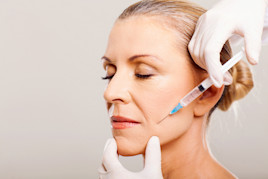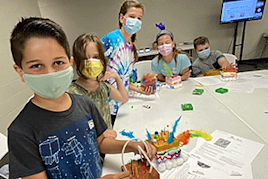AAD members bring skin cancer screening to underserved Latino farm workers

Calexico is a city located about two hours from San Diego, at the California/Mexico border. Although I have volunteered for many skin cancer screenings before, this one was notably different.
We arrived in Calexico at midnight in order to screen the field workers from 1:00 a.m. to 4:00 a.m. When I initially signed up to perform the skin cancer screenings, I thought “a.m.” was a typo in the email I got from Academy staff. When the unusual time of the screening was confirmed, I was not surprised that this was the first skin cancer screening the consulate was able to arrange since the Annual Health Fair first began.
The farm workers – some who cross the border daily for work – are bused to farms all around San Diego and Imperial Counties. The buses leave at 4:00 a.m. so the workers can start their shifts by 6 a.m. every day. They scatter to work on many farms around the two counties, so their work is done at different times, and they may be too dusty to be screened after work. To accommodate their schedule, the event is scheduled every year before their work day begins at four in the morning – a new perspective for next time I’m tempted to complain about my schedule.
Annual Farm Workers Health Fair
Workers line up for free health care at the Annual Farm Workers Health Fair.

As we started the screening and conversed with more and more of the workers, we were overwhelmed by their gratitude, and at the same time, we were overcome by sadness. They were men and women of all ages – from the very young to the very old – and none of them had ever worn or been told to wear sun-protective clothing for work, despite spending all their working days in the hot California sun. In any other field of work I could think of, not being protected from what could harm you while working would be against the law.
“We arrived in Calexico at midnight in order to screen the field workers from 1:00 a.m. to 4:00 a.m. When I initially signed up to perform the skin cancer screenings, I thought “a.m.” was a typo in the email I got from Academy staff.”
Most of the field workers had significant skin damage from working in the sun all day. In our regular practice, it’s rare to see Hispanic patients with that much sun damage, but with such extensive exposure and no protection, darker skin alone is an insignificant advantage.
But perhaps the saddest part about our experience screening the workers was that many of them were convinced they had skin cancer and sat down in relief when we informed them that they didn’t. Although we saw a few concerning legions – mostly non-melanoma skin cancers – we mostly saw seborrheic keratoses, skin tags, rashes, and even scabies. Almost all of the field workers thought that these issues were skin cancer. Worse, it was clear to us that many of them had carried this burden for years with no one to turn to for help.
By the end of the screening, we had examined more than 60 workers and educated dozens more. We gave them brochures, UV bracelets and sunscreen samples – made available for free from the Academy. My goal after this screening is to do what I can to help these workers obtain sun-protective shirts and hats. We are working to establish a fund raising campaign for this purpose, and we will ask for your help in the near future.
For Maria and I, this was a truly meaningful skin cancer screening. Skin cancer screenings are always rewarding, but helping the underserved adds another layer of fulfillment, and the field workers in Calexico are about as underserved as it gets.
According to the National Center for Farmworker Health, Inc., there are over three million migrant and seasonal farm workers in the U.S. and 68% are from Mexico. Unfortunately, factors like poverty, frequent mobility, low literacy, language, and cultural barriers impede their access to social services and cost-effective health care.
“There are few things in dermatology as rewarding as doing skin cancer screenings for the underserved, and the field workers in Calexico are about as underserved as you can get.”
The Academy started the Latino Outreach program to provide skin cancer education and screenings to farm workers in California, Arizona, Texas and Florida. Under the program, the Academy coordinates with member dermatologists and Mexican consulates in the U.S. to offer free skin cancer screenings as part of the consulates’ regular, on-site health programming. Since its inception, the program has expanded to include low-income working Latino families and Latinos living below the poverty line in multiple U.S. states.
If you have the opportunity to volunteer for a skin cancer at any of the Mexican consulates in the U.S., I encourage you to do so. Perhaps now more than ever, these individuals and their families need us, and they need affordable, quality health care. By donating your time to conduct free skin cancer screenings with the Academy, you can really help make a difference in their lives.
Antoanella Calame, MD, is the Director of Compass Dermatopathology, in San Diego, California, a Volunteer Clinical Professor at University of California, San Diego, and an active volunteer for the Academy’s Latino Outreach program.
To learn more about the Latino Outreach program or volunteer for a screening, contact Brenda Hilligoss, Manager of the Academy’s Community Outreach Program, at 847-240-1415 or bhilligoss@aad.org.
 Think sun protection during Skin Cancer Awareness Month
Think sun protection during Skin Cancer Awareness Month
 How to care for your skin if you have lupus
How to care for your skin if you have lupus
 Practice Safe Sun
Practice Safe Sun
 Sunscreen FAQs
Sunscreen FAQs
 Fade dark spots
Fade dark spots
 Hidradenitis suppurativa
Hidradenitis suppurativa
 Laser hair removal
Laser hair removal
 Scar treatment
Scar treatment
 Botox
Botox
 Kids' camp - Camp Discovery
Kids' camp - Camp Discovery
 Dermatologist-approved lesson plans, activities you can use
Dermatologist-approved lesson plans, activities you can use
 Find a Dermatologist
Find a Dermatologist
 Why choose a board-certified dermatologist?
Why choose a board-certified dermatologist?